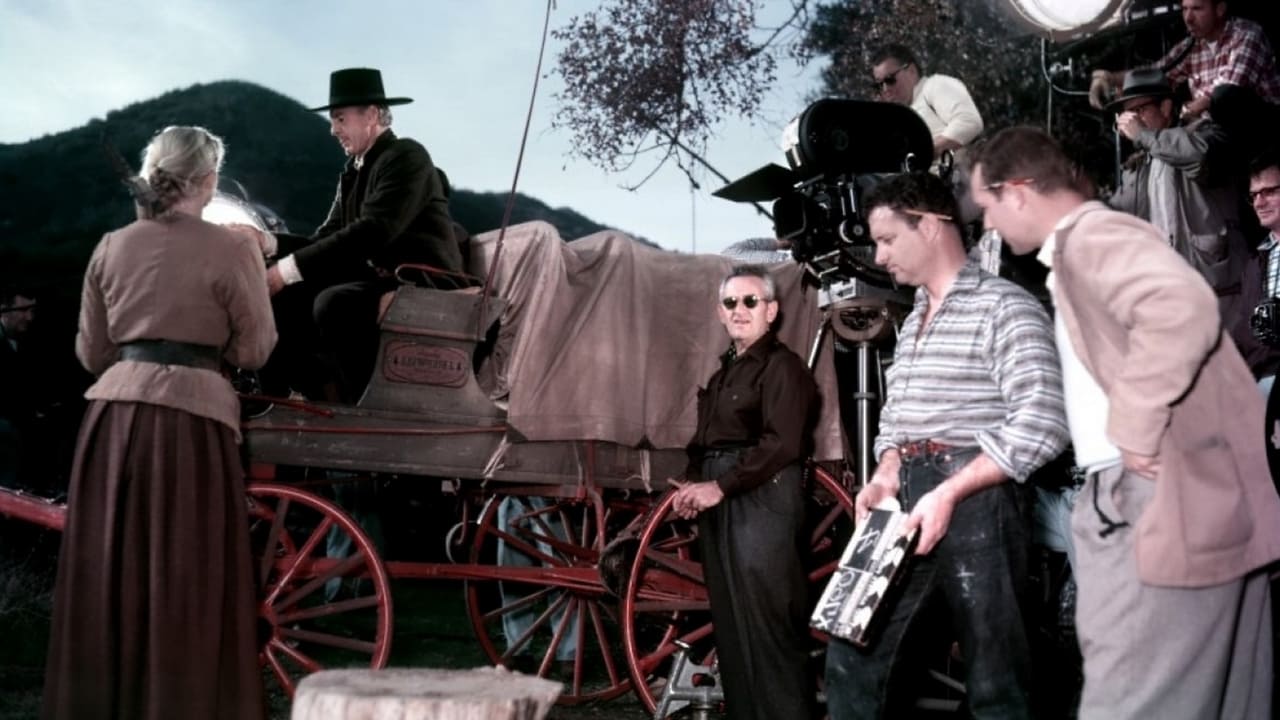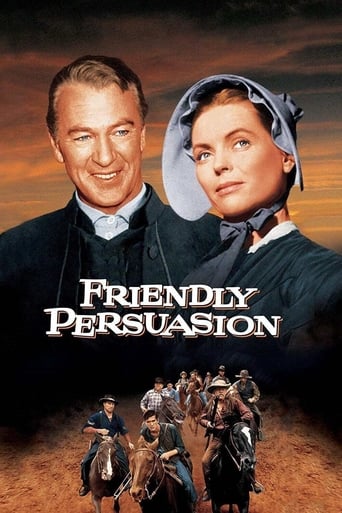

Spoilers. Observations. Opinions.A lovely film. Quakers are shown as serene, caring, spiritual farmers. I kept thinking of Amish when I was viewing this film, especially the black buggies and simple types of lives. There is so much recent press about Amish people, but less about Quakers.The Quakers' religious opposites are shown here as wearing colorful garments, while the Quakers in their church dress in gray, black and some tan. The Methodists believe in singing, but the Quakers frown on that sinful type of amusement.The mother seems like she liked dancing before her marriage, and that now her beliefs prohibit her from such enjoyment.The Civil War. People's ancestors came here, some of them, for religious freedom. Did that mean that they would not fight to maintain that freedom? Would they not fight to protect their families and properties?Were Quakers hiding behind the skirts of their religion so they would not have to fight? Did Lincoln's draft exclude Quakers and other conscientious objectors?Did Morgan invade Indiana? I know he invaded southern Ohio, where today those towns celebrate the romance of that rogue.This story took place north of the Ohio River. Tons of American Civil War Battles took place below the Mason-Dixon Line, but hardly any in Union territory. The northern biggie was in Gettysburg, Pennsylvania over the 4th of July period in 1863, tons of miles away from the Indiana of this story, and a year later. Is this film's Civil War depiction about the Confederates accurate? Maybe so, but I haven't heard of it.Matter of fact, the Ohio River was a major dividing line between north and south, meaning that some people along both sides of the river were not always true to their side. Some people north of the river were Southern sympathizers. Some people south of the river were Northern sympathizers. You talk about brother against brother.Total war: done in the countryside and in towns, such as was done in Gettysburg, Pennsylvania. From my historic war studies at university, regular or standard war is done on a real battlefield, where civilians and their private properties are not involved in the fighting. On a standard battlefield, there are no homebound women and children to be held hostage, and no food stores, livestock, silverware or candlesticks to be stolen -- no houses to be set on fire.The daughter in this film is not discussed much in comments here. The males are glorified, and the mother is admired. The daughter looks twelve to fourteen, in love with a Northern officer, who may be about twenty to twenty-one years of age. The actress playing this daughter was in real life around thirty years old during filming, so this was quite a stretch.More female observations: The three daughters of Marjorie Main were a total hoot, devouring Anthony Perkins with their eyes. They all wanted that man. Marjorie, meanwhile, was still in love, obviously, with her late husband. Marjorie, apparently, did not come on to Gary Cooper; Marjorie needed to fix her hair, anyway. Samantha the goose was a real scene stealer, and was one of the stars of the show.I am a degreed historian from university, studying many courses about the American Civil War, including military history, Civil War medicine, slavery, women's history and domestic interests, religious history of Christianity. I am also an actress, dancer, singer, stage makeup artist and fashion designer. I am a long-term film critic and movie reviewer for IMDb, with around 400 critiques and reviews since 2002.
... View MoreThere are generally two kinds of movies regarding war, those that glorify it, and those that condemn it. Rarely, though, are there ones that bridge that perilous divide with such elegance, insight, and charm. This is due in part to the casting, with an impeccable Gary Cooper, and an equally accomplished co-star in Anthony Perkins. But every great film requires a great man at the helm and who could compare with Billy Wilder, a true American treasure. This movie also stands as a emotional look at the war between the states, what we call the Civil War. Many families and communities were torn apart by that war, and although we hear about those travails in books, capturing it on film is an entirely different story. This film does it so well. In today's films, featuring bloodshed and violence on a scale unheard of when this film was produced, watching it again as a 65-year old man still brought tears to my eyes. It was truly a gentler, "sweeter" time then, which this movie captures so well. Although there is a modicum of violence in this film, it only serves the plot... of the utter senselessness of war.
... View MoreThis is the interesting and solidly performed story of a family of Quakers in Southern Indiana in 1862 . This religious sect is strongly opposed to violence and war . The official name of the Quaker religion is Society of Friends , members of the faith are called Friends and nicknamed Quakers ; the book written by Jessamyn West is called "The Friendly Persuasion", meaning the faith , which more specifically refers to the Quakers' way of communicating. It concerns about "Jess Birdwell" (Gary Cooper , he initially turned the film down because he didn't believe the American public would accept him as Quaker , and role was originally intended for Bing Crosby) is the patriarch of a family of Quakers , a Christian sect that refuses to take part in wars . His son "Josh" (Anthony Perkins) wishes to adhere to pacifism but worried he's using his religion to hide his cowardice , he then enlists the army , causing angry on his mother (Dorothy McGuire , though Katharine Hepburn turned down the role and Jean Arthur was considered to play her) . Their children are very special : the little boy Jess Jr. (Richard Eyer) lives in conflict with the goose "Samantha" . And "Mattie" (Phyllis Love) falls in love with an Union soldier, "Gard Jordan" (Peter Mark Richman) . As Jess/Gary Cooper (before Cooper became involved Montgomery Clift was offered the role of Birdwell, but turned it down) along with his family attempt to remain to its ideals , despite the Civil War which touches their farm life .This enjoyable film packs comedy , religious and familiar life , sense of mood , spectacular battles and lots of reflection . As it deals with the conflict between maintaining a religious belief and reality when takes place a bloody war ; as the flick utterly catches up the spectator in the family's troubles . This earnest picture captures a tender humor and mirth which pervades the whole story ; in addition , at the end occurs a stirring climax . Agreeable screenplay , originally released without screen writing credit due to blacklisting of Michael Wilson; credits restored in 1996 . Spectacular battle depicted in the film based on facts, as the final is very exciting , it was against the Confederate raiders led by General John Hunt Morgan ; on July 9, 1863, 450 members of the Indiana Home Guard met John Hunt Morgan's raiders in battle south of the town of Corydon, Indiana . Gary Cooper as a devout Quaker father and Dorothy McGuire as his wife are very well as the parents ; furthermore , Anthony Perkins is nice as the son fearing being taken for a coward . Good support cast such as Robert Middleton , Peter Mark Richman , Richard Hale , Russell Simpson and uncredited , almost extras : Robert Fuller , William Schallert , John Dierkes , Joe Turkel and Doug McClure . Spectacular and glowingly gorgeous scenarios , including amusing race horses . Colorful and glimmer cinematography by Ellsworth Fredericks in De Luxe Colour Photography . Sensitive as well as moving musical score by the classical composer Dimitri Tiomkin . The motion picture come out of a minor Hollywood studio , Allied Artists , was compellingly directed by the maestro William Wyler . Wyler was considered by his peers as second only to John Ford as a master craftsman of cinema and the winner of three Best Director Academy Awards . Wyler was a great professional who had a career full of successes in all kind of genres as Film Noir : ¨Detective story¨ , ¨The desperate hours¨ , ¨Dead End¨ ; Western : ¨The Westener¨, ¨Friendly persuasion¨ , ¨Big Country¨ , but his speciality were dramas such as : ¨Jezebel¨ , ¨The letter¨ , ¨Wuthering Heights¨ , ¨The best years of our lives¨, ¨Mrs Miniver¨, ¨The heiress¨ , ¨the little Foxes¨ , ¨The collector¨ and Comedy as two films starred by Audrey Hepburn : ¨How to steal a million¨ and of course the immortal comedy-romance ¨Roman's holiday¨ . ¨Friendly persuasion¨ results to be a good film that catches up the audience . Rating : Better than average , worthwhile seeing .
... View MoreGreetings again from the darkness. Released in 1956, this William Wyler film holds up today because some of the debate and dilemmas touched on remain unresolved 57 years (and numerous wars) later. The film takes place in 1860's Indiana as the Civil War rages. The story is told from the perspective of a pacifist Quaker family and is based on the 1945 book by Jessamyn West.The patriarch of this Quaker family is played by Gary Cooper, who was four years past his Oscar winning performance in High Noon, and five years from his death due to cancer. His wife, the Minister Eliza, is played well by Dorothy McGuire, who the following year would play the mother in Old Yeller. The film's best performance comes from young Anthony Perkins (his second film) who of course made cinematic history as Norman Bates in the 1960 classic Psycho. Both of these Perkins characters share mommy issues and complicated decisions of conscience.The opposition to war and violence is the main theme here, and there have been many interpretations over the years. Is it religious belief or fear that prevents the men from joining the cause? At least Perkins' character is honest enough to wonder. Cooper kind of plays against type here since he was so often a man of movie action, but in reality his strength of character and belief allows him to maintain his image.Comedy relief is at hand given the youngest son's ongoing battle with Samantha the Goose, a family pet with devious attack modes. And daughter Mattie, played by Phyllis Love, falls madly in love with a soldier played by Peter Mark Richman. See, every character has their own personal battles and decisions regarding conscience and violence.The great Margaret Main has a sequence as a single mother of three daughters (every one a gem!). The daughters introduce Cooper and Perkins to the joys of music ... forbidden by the Quaker church. One of the daughters is played by Marjorie Durant, whose father was a writer and assistant to Charlie Chaplin. Her grandmother married EF Hutton, so Ms. Durant could have spent a great deal of time researching her only family stories.While it's difficult to understand these days, screenwriter Michael Wilson was not originally credited for his work. He was on the Hollywood Blacklist, and his screen credit was not reinstated until 1996. William Wyler was one of the most successful directors in Hollywood history and his resume includes Jezebel, Mrs Miniver, The Best Years of Our Lives, and of course, Ben-Hur. Though this movie was nominated for 6 Academy Awards, it didn't win any and lost out to Best Picture winner Around the World in 80 Days. A final note of interest, this was Ronald Reagan's favorite movie and he presented a copy to Mikhail Gorbachev in hopes the message would prove the downside to war.
... View More